
Book Review sent in by Maj Agha Amin. Unfortunately the pictures in the original are low quality and I was unable to fix that problem. Still, you will get the gist of it.
This is a very interesting book by a Montana University (adjunct) Professor (Owen Sirrs).
The author explains that the genesis of this book was his:– (page-9)
“Two- month stay at the Counterinsurgency Training Center in Kabul, Afghanistan during the summer of 2009. It was there that I learned a great deal more about Afghanistan–Pakistan relations in general and ISI operations in Afghanistan in particular.”
The book examines the following issues in the writers own words:–
- How has ISI evolved as an institution exercising intelligence and security responsibilities at home and abroad? What were the driving forces behind that evolutionary process?
- How does ISI fit into the larger Pakistani Intelligence Community?
- What does the decades- old relationship between ISI and the CIA tell us about the larger US–Pakistan security relationship?
- What is ISI’s record in providing accurate and timely early warning intelligence to decision- makers?
- To what extent has ISI disrupted and abused Pakistan’s democratic processes?
- Is ISI a rogue agency or a state within a state?
- Can ISI be reined in and the PIC (Pakistani Intelligence community) reformed?
- How has ISI employed UW (Unconventional warfare) in support of the state’s national security objectives? To what extent has UW been a successful strategy for Pakistan?
These are the very interesting question that the writer has formulated as stated in the books beginning and has attempted to answer in this most interesting book.
On page-7 I must add that some of the authors sources have produced some really classical pearls of confusion and nonsense like late Syed Saleem Shahzad and living Steve Coll.
![]()
On page-7 our author starts moralizing and states :–
![]()
![]()
How writers can assume such an air of arrogance is hard to understand ?
Map of Kashmir on page 15 is apology of a decent map.I am surprised at the cartographical poverty of our learned adjunct professor.
Our author makes false and uninformed assertions about how the Kashmir proxy war started on page-16 in a haste to blame the Pakistani military for all the so called perceived ills as the author views them.Like he fallaciously claims that the idea of Kashmir war originated from Colonel Akbar Khan,DSO:–

The Muslim League’s high command had tasked Mian Iftikhar ud Din Minister for Refugees to prepare a plan aimed at ensuring that the Muslim majority state of Kashmir should join Pakistan. Brigadier Akbar Khan then serving in the Pakistani GHQ wrote an appreciation ‘armed revolt inside Kashmir ‘ on Mian Iftikhar ud Din’s request.
The writers assertions on above mentioned page 16 are nothing short of sheer intellectual dishonesty as he falsely claims that it was the army colonel Akbar Khan who forced Jihad in Kashmir on the government.This is a factually incorrect statement.
On page 214 of his book Sardar Shaukat Hayat the man directly responsible for Pakistans proxy war invasion of Kashmir clearly states the sequence of events :–
“Seeing the Maharajas and Indias bad faith,we therefore decided to walk into Kashmir.I was put in charge of operations.I asked for the services of Brigadier Sher Khan and Brigadier Akbar both of 6/13th Frontier Force”.
The author could have easily found this book published in April 1995 but did not ! And more deadly is his basic intellectual dishonesty in preparing a moral case against Pakistan Army by falsely claiming that the invasion was Colonel Akbar Khans idea forced upon civilians who were not very keen possibly !
On page 16 our author starts making basic factual mistakes :–
![]()
As a matter of fact the tribal invasion of Kashmir began on 20th October 1947 and the tribesmen on night of 20/21st October had crossed the Neelam River bridge in Kashmir.
Muzaffarabad had been captured on morning of 21st October 1947, while our author states that the tribal invasion commenced on 22 October 1947.
On the same page 16 the author makes broad brush statements, like he states that proxy war precedent was a Pakistani innovation;

He totally ignores or forgets or is not aware that proxy wars was a British inheritance of Pakistani state.
The British regularly used proxies for their military purposes as in 1929 when they planned and executed a huge operation with base in North Waziristan to assemble a tribal lashkar very similar to Kashmir 1947 to remove Bacha Saqao in Kabul.
The writer is bad and sloppy with his sources also. He could have quoted Colonel Yahya Effendis book published in 2007 to reinforce his elaboration of proxy war in Kashmir. Effendi in his book examines in detail how Pakistan Army supported the war in Kashmir.
The writer could have inserted a major Pakistani intelligence failure in his book if he read all the available sources carefully. Like in late 1947 many days before Indian Army arrived in Kashmir the Indians by mistake sent the whole war plan to Lahore by mistake. The plan was sent to Pakistans Director Military Intelligence Brigadier Sher Khan in Pakistan Army Headquarters but Sher Khan as per General Musas narrative in his book “From Jawan to General” just sat on the crucial information.
On page 17 I started having serious doubts about our authors research when he totally falsely states that Pakistans first Intelligence Bureau boss G.Ahmad was a Bengali ! ![]()
I am perplexed why on earth American authors have to get involved in such unnecessary and fallacious matters.
The fact of the matter is that G.Ahmad was a diehard Punjabi and had no connection with Bengal. Interestingly G.Ahmad was brother of Aziz Ahmad and both brothers had the unique precedent of serving as Pakistan’s ambassadors to USA one after the other.
On page 21 the author again starts making nonsense statements like elevating Sahibzada Yaqub to an Indian ruling family while he was a small time younger son of an Indian nawab.
On page 22 , again the writer starts making uninformed and naieve statements like below :–

As a matter of fact Pakistans official history of Kashmir war, published in 1970 , contrary to our brilliant adjunct professors assertions states that Pakistan wanted a ceasefire and the very strategic aim of Pakistans Operation Venus was creating conditions where India should accept a ceasefire. But our brilliant author claims that both Pakistan and India were unhappy with ceasefire.
On page 50 our brilliant analyst promotes Aziz Ahmad who was Pakistan’s Foreign Secretary to the rank of Minister of State !
The worst part of the book is the authors sloppy handling of Pakistan’s greatest strategic intelligence failure in 1965. Here he most unimaginatively quotes Shuja Nawaz whose book was only published in 2008 and gives a totally “false and misleading picture of Pakistans greatest intelligence failure”.
In endnote number 6 our briliant author quotes Shuja Nawazs books dumb passage below but fails to explain what actually happened and who failed in Pakistans intelligence set up ?

The above is page 222 of Shuja Nawaz’s book Crossed Swords which our author quotes. Shuja in turn quotes Major General Shaukat Razas book which also conveniently hoodwinks who committed the intelligence failure. As Shaukat Riza meekishly and evasively made a very round about statement :–
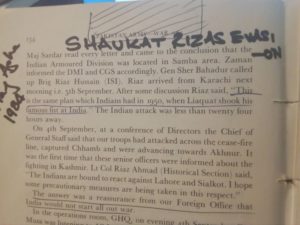
Our brilliant adjunct professor leads the reader who hardly knows anything into total darkness ! Major General Shaukat Riza in above passage committed the worst possible act of intellectual dishonesty. He passed the total blame to Pakistans foreign office whereas it was Pakistans Director Military Intelligence Brigadier Irshad Ahmad Khan who had actually failed. This I discovered only in March 2001 when I met and interviewed Major General Naseer ullah Khan Babar who explained as below :–
“Q: Did the standard of training of the Army improve after 1965 or not?
I would say that very few lessons were learnt. The Army was run on personal likes and dislikes. Thus Brigadier Irshad who was one of the principal characters responsible for the intelligence failure as Director Military Intelligence was promoted whereas in terms of justice he should have been retired. Characters like A.A.K Niazi who had nothing to do with any fighting were awarded Hilal-i-Jurrat for some action which never took place at Zafarwal simply because he was from Ayub Khan’s unit. Thus Niazi was promoted to General rank and we finally saw him in East Pakistan. That is history. In 1962 while writing a.a k Niazi’s ACR for the year 1960-61 Major General Atiq ur Rahman had written that “This officer had reached his ceiling and should not be promoted to Brigadier rank”. Unfortunately, it was an Army run on personal likes and dislikes. Niazi was from Ayub Khan’s unit! Ayub Khan ignored Atiq ur Rahman’s report and promoted Niazi to Brigadier rank.
Q: Please describe this intelligence failure on part of the dmi in greater detail ?
The SSG captured a dispatch rider of the Indian Army on the Jammu Samba Road on night 3/4 September 65 carrying the mail of the Indian 1st Armoured Division. This mail bag was taken by Director Aviation Brigadier Mahmud to the DMI Brigadier Irshad who dismissed it as an Indian deception plan! Thus the DMI insisted that the Indian 1st Armoured Division was at Jandiala Guru, East of Amritsar while in reality it was in Samba area right next to our jugular vein in Sialkot sector! Thus once the Indian 1st Armoured Division attacked us opposite Chawinda on 8th September we were caught off balance. And then kept reacting to situations. The initiative had been lost, thanks to intelligence. The move of the formation takes 7-10 days, which acts as warning time.
(Refers this scribes interview published in Defence Journal April 2001 issue).
This interview was available on internet and the so called brilliant writer and chronicler on ISI could have found it and quoted it .
Shuja Nawaz’s book was published only in 2008 and like Shaukat Riza, covered up Pakistan Army Military Intelligence and not ISIs greatest strategic intelligence failure in its history.
Brigadier Irshad the greatest intelligence failure culprit in Pakistans military history was given clean chit by both Shaukat Riza in 1984 and Shuja Nawaz in 2008 and now by our brilliant author in 2017.
In chapter titled ISI at War I agree with the writers analysis that ISI was a total strategic failure in 1971 war. On the other hand, a major failure of the author in this chapter is the fact that ISI managed to get hold of complete Indian plan to attack East Pakistan in December 1971 but Pakistan’s military leadership failed to tailor Pakistan’s counter offensive plans. This is a major failure of this book in the sense that obtaining this Indian plan was a major ISI coup. Indian Western Command chief Candeth in his book The Western Front states that if Pakistan Army had launched a pre emptive attack before 26 september all of Indian plans to attack East Pakistan would have gone to winds. So ISI had achieved a major intelligence task by getting hold of this plan but Pakistan’s military leadership failed, not the ISI, but our brilliant author remains biased against ISI.
The writer’s knowledge of ISI role in Afghan war is faulty; for example on page 114 he mentions a very junior major Tarar but totally forgets about the real ISI pioneer of Soviet Afghan war, Brigadier Raza Ali .
The authors sources about Akhtar Abdul Rahman are incomplete . I interviewed Colonel Salman of 2 Commando and ISI in 2000 and he described Akhtar Abdul Rahman as mediocre and singled out Brigadier Raza Ali as the real architect of ISIs Afghan covert war.
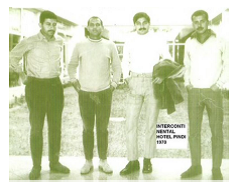
The author’s claims about suicide bombings in Afghanistan is non factual .
Below map from this scribe’s book illustrates the point :–
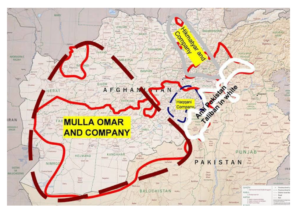
On page 232 , evasive and tactful to the point of being intellectually dishonest our writer gives a light touch to USA’s total strategic intelligence failure in Afghanistan while correctly assessing ISIs true strategy in Afghanistan :–

I wish he was more blunt and truthful.
On page 237 the author states that by 2009 all westerners thought that no military solution in Afghanistan was possible but he has little to say about Obama, Bruce Riedel, Mc Chrystal and Petraeus pointless and totally unnecessary so called surge of 2009-11 and the resultant massive US casualties.
On page 239 the writer repeats the age old US nonsense about Haqqani group but forgets that the real ISI proxy which inflicted maximum casualties on US army was Mulla Omar group.
The writers assertions about ISI CIA cooperation in drone strikes is interesting but fails to note that ISI only allowing drone strikes in north and south Waziristan created a huge pashtun insurrection in Pakistan :– (page-271)

And the worst part is that the author has nothing to say about the fact that the so called CIA drones he fallaciously calls successful failed to target the real killers of US troops in Afghanistan based in Pakistani Baluchistan.
The writers criticism of ISIs wars in Afghanistan is without substance :– (page-291)
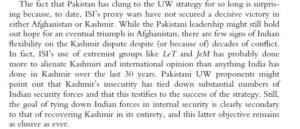
He has nothing to state about why USA failed in Afghanistan and why USA lacks the strategic resolution to confront the Pakistani state and the ISI ?
On page 296 our evasive and non committal author gives the ISI a clean chit :–
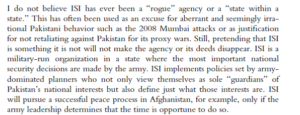
But he fails to analyse that the real issue is not that ISI is not a state within a state but the fact that Pakistan is not a state with an army, but an army with a state.
More seriously all along the author fails to analyse why the CIA failed as an agency in judging true ISI intentions in Afghanistan war that the USA waged inconclusively .
I agree with the last paragraph of the book :–
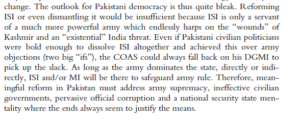
The book is interesting and thought provoking.
Writing intelligence history of an intelligence agency is no easy task , so Mr Owen deserves credit for that . However he could still have done better if he had been more careful with his sources and more blunt and truthful in his analysis.